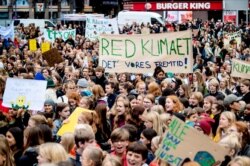Denmark's climate minister says his country hopes to set an example for the world with an ambitious scheme to cut carbon emissions by 70% in little more than a decade, but it has no illusions that it can have a meaningful impact on global warming by itself.
“To be honest, for the climate, even if we just close down our country tomorrow, it wouldn’t help much,” Dan Jørgensen told VOA during a visit to Washington. “I guess you can argue: ‘Does it really matter what you do?’ ”
Jørgensen said Denmark accounts for just 0.1% of the world’s carbon emissions, a drop in the bucket compared to the largest polluters such as China, the United States and India. But he said, “The reason we do these things anyway is that if we succeed in doing that, then hopefully we’ll inspire others.”
Jørgensen, who will be in New York to promote his country’s climate agenda at the United Nations, said his country hopes to demonstrate that it can carry out a green transformation and still be competitive in the global marketplace. In the process, it expects to develop new technologies that “other countries can also use.”
Stages of debate
According to Jørgensen, the climate debate in Denmark has gone through several stages since the issue started to enter the public's consciousness about 15 or 20 years ago.
At that time, he said, some in Denmark still questioned how real climate change was and whether humans had anything to do with it. That was followed by a period in which the public by and large understood that climate change was real, but some remained reluctant to devote resources to the problem, concerned that efforts by Denmark alone would be futile.
Now, he said, most people agree on the nature of the problem. Looking out the window, "they see droughts, they see flooding, they see extreme weather phenomena," he said. "We are also a nation that's closely connected to Greenland," one of the places where climate change is most evident in the form of melting glaciers.
With that consensus, the debate has shifted to an energetic discussion about the best policy instruments to address the problem.
The issue so dominated Danish general elections in June that the campaign has been described as the country's "first climate election," with the question of how to achieve a green transformation topping the agenda in debates among the candidates for prime minister and other posts.
Looking beyond Denmark, Jørgensen said Denmark and its partners in the European Union were sad to see the United States withdraw from the Paris climate agreement and hope it will reconsider. "There's nothing I would hope more than the U.S. taking leadership on the global stage also on green issues," he said.
Join the battle
Meanwhile, Jørgensen said, all countries and especially the "big growing economies" must join in the battle to prevent climate change "from becoming irreversible and having the most catastrophic consequences."
But he acknowledges the frustration of newly developing countries, which are only now acquiring energy-intensive amenities that the developed nations have long enjoyed.
"It's not up to us who've been polluting and emitting greenhouse gases for more than 100 years — when I say us, I mean the West, the United States, Europe — it's not up to us to tell them, 'No, you cannot drive a car, you cannot buy a fridge or an air conditioner, no, you can't start to eat meat a few times a week because you can afford it all of a sudden because you've come out of poverty.' "
Rather, he said, it is up to Denmark and the other developed countries to say, "Can we help you in any way to make that growth green?"












